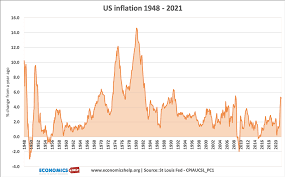Examining The Ripple Effect Between Inflation and Oil Prices

Policymakers, investors, economists, and the general public are interested and concerned about the relationship between inflation and oil prices.
Both inflation and oil price forecast significantly influence your country’s economic landscape and the global economy.
For novice traders, VSTAR is a user-friendly platform for trading oil, gold, currency pairs, stock, and more. The charges and transaction fees are low, and you can start trading with virtual money.
In this post, let’s delve into the intricate network of connections between inflation and oil prices, which can trigger a ripple effect on one another.
The Oil Price-Inflation Relationship
1. Oil as a Key Input
In modern economies, oil is a critical component serving as –
- A primary energy source in various industries
- A transportation fuel
Consequently, rise and fall in oil prices can have ripple effects on businesses’ cost structure and the overall economy.
2. Supply and Demand Dynamics
The relationship between oil prices and inflation can be partially accredited to supply and demand subtleties. When oil demand surges globally, the prices tend to rise.
Higher oil prices can increase overall production costs for businesses, which results in higher prices for goods and services, ultimately contributing to inflation.
Gold is immune to inflation, but before you start trading, read gold trading tips online to ensure consistent gains.
3. Cost-Push Inflation
- Cost-push inflation happens when the overall production cost increases due to a spike in oil rates. It forces the company to increase its product costs.
- This inflationary pressure can broadcast throughout the economy, distressing the prices of energy-related goods and non-energy-related products.
Inflation’s Impact on Oil Prices
1. Currency Depreciation
Inflation can grind down a nation’s currency’s purchasing power, leading to currency depreciation.
- When the value of a currency declines, it takes more units of that currency to purchase the same quantity of oil in international markets.
- This can lead to higher oil prices in the local currency, even if global oil prices remain relatively stable.
2. Inflation Expectations
Expectations of future inflation can influence oil prices. If investors and market participants anticipate rising inflation, they may seek to protect their assets by investing in commodities like oil, driving up demand and oil prices.
Policy Implications
1. Central Bank Actions
When formulating monetary policy, central banks often consider the influence of oil prices on inflation.
- If oil prices are rising rapidly and intimidating inflation in fuel rates, the central banks may tighten the monetary policy to keep inflation in check.
2. Energy Policy
The government’s energy policy can influence the relationship between oil prices and inflation.
- Promoting energy efficiency
- Invest in renewable energy sources
- Diversifying the energy mix
These factors can reduce a nation’s dependence on oil and alleviate the inflationary influence on oil price fluctuations.
Conclusion
The ripple effect between inflation and oil prices is a complicated relationship.
- Changes in oil prices can contribute to inflation through cost-push mechanisms, while inflation can also impact oil prices through currency depreciation and market expectations.
Understanding this tricky connection is crucial for traders looking to earn profits from money movements.
